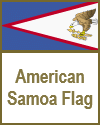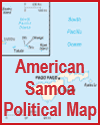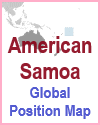American Samoa, an unincorporated territory of the United States, is located in the South Pacific Ocean, southeast of Samoa. The territory comprises five main islands--Tutuila, Aunu'u, Ofu, Olosega, and Ta'u--as well as two coral atolls, Rose Atoll and Swains Island. Tutuila is the largest island and home to the capital, Pago Pago, which serves as the economic and administrative hub.
With a population of approximately 55,000 people, American Samoa is known for its stunning landscapes, including volcanic mountains, lush rainforests, and pristine beaches. The territory's economy is primarily based on tuna fishing and canning, with significant contributions from government employment and remittances from American Samoans living abroad. Tourism is growing, driven by the islands' natural beauty and unique cultural heritage.
Culturally, American Samoa maintains a strong Polynesian identity, deeply rooted in traditional practices known as fa'a Samoa, or "The Samoan Way." This cultural framework emphasizes communal living, respect for elders, and the importance of family and community. Traditional music, dance, and crafts are integral parts of daily life, reflecting the rich cultural heritage.
Despite challenges such as economic dependency and vulnerability to natural disasters, American Samoa continues to thrive by balancing traditional ways with modern influences, preserving its unique cultural identity while fostering economic development and resilience.
|












